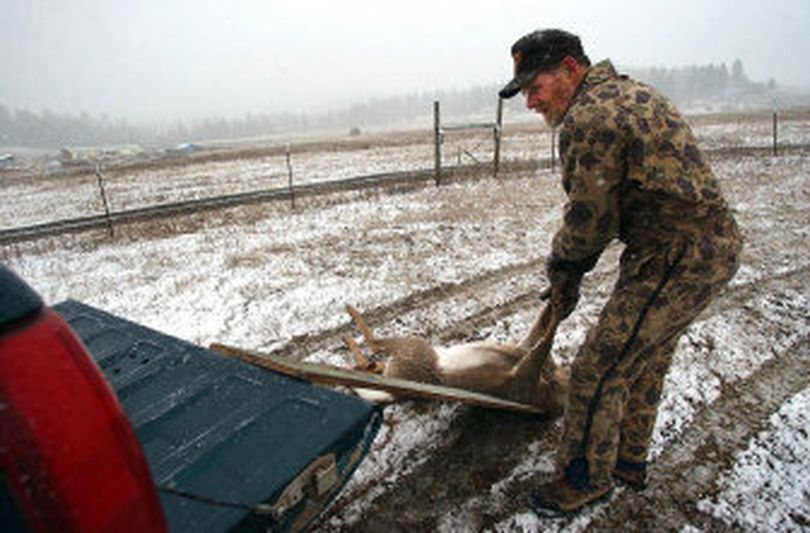Roadkill: it’s what’s for dinner in Montana

Updated 11-26-13 at 9 a.m. with correction from Montana Fish, Wildlife and Parks.
WILDLIFE -- Just in time for Thanksgiving! Montana's online permitting system to legally take possession of road-killed big game goes operational today.
A new state law allows people to salvage deer, elk, antelope and moose killed on roadsides.
According to reporter Rob Chaney of the Missoulian, anyone wanting to claim one of those game animals they find dead can fill out the online permit within 24 hours. State law enforcement officers will also have permits available if called to the site of an animal-vehicle collision. The permits are free.
The move could offer a lot of extra protein to Montana dinner tables albeit at the expense of beetles, ravens, eagles, coyotes and other critters in nature's clean-up crew. The Missoulian reports:
- In 2012, Montana motorists hit 4,754 whitetail deer, 1,977 mule deer, 220 elk, 72 antelope and 28 moose, according to state Department of Transportation records.
- They also hit 39 black bears, five grizzly bears, six mountain lions, 15 bighorn sheep, an uncertain number of wolves, and uncounted birds of prey and furbearing mammals. Those predators, birds and sheep are not allowed for roadkill possession.
- At least 17 other U.S. states allow some level of roadkill possession and consumption.
But Washington is not one of them. It's illegal to pick up roadkill without a permit in Washington.
Read on for more details about the Montana law and salvage permit system:
Accepting the permit requires a person to take the entire animal away from the impact site as-is for cleaning elsewhere. No guts or other remains may be left at the roadside, and they must be disposed of in a sanitary manner.
Permitees also must allow law enforcement officers to inspect the carcass, parts or meat, as well as show the location where the animal was picked up. Officers may review permits at a later date to ensure people aren't abusing the privilege.
People may not kill animals wounded in a vehicle collision unless they have a valid big-game hunting license in season. Only already-dead animals may be salvaged with the new permits.
The salvaged animals must be used for the permitee's consumption - they may not be donated or sold to others, or used for bait or pet food.
The following are frequently asked questions about Montana's roadkill permit law:
Q: What wildlife can I salvage?
A: Only deer, elk, antelope and moose. It's still illegal to collect furbearers such as bobcats or mink, large predators including bears, mountain lions and wolves, and raptors (hawks, eagles and owls), bighorn sheep or mountain goats. Domestic livestock and pets may not be salvaged. Nongame animals such as coyotes and raccoons may be taken without a permit.
Q: What do I have to do?
A: You must remove the entire carcass from the roadside and dispose of any unsalvageable remains in a sanitary manner. Get a permit for the carcass within 24 hours from any state law enforcement officer or online at fwp.mt.gov. Be willing to submit all salvageable parts for inspection by law enforcement.
Q: What am I not allowed to do?
A: You can't kill an animal injured in a roadway collision unless you have a valid hunting license for that species. (Montana Fish, Wildlife and Parks officials say this statement in the Missoulian is incorrect. They asked newspapers to make t his correction: The only person who can dispatch an animal injured in vehicle collision is a law enforcement official.)
You can't take any trophy parts (antlers, horns, teeth, etc.) and leave the rest. You can't process (skinning, gutting, butchering) the animal in the public right-of-way, including the barrow pits. You can't use salvaged roadkill for bait.
State law is contradictory on disposal of wildlife remains. Hunters are allowed to leave guts and other inedible parts in the woods after a legal kill, and may also feed wild meat to pets. But the new law on salvaged roadkill restricts the disposal of any remains to a licensed sanitary landfill or official composting site. It also limits use to "human consumption" - no dog food.
